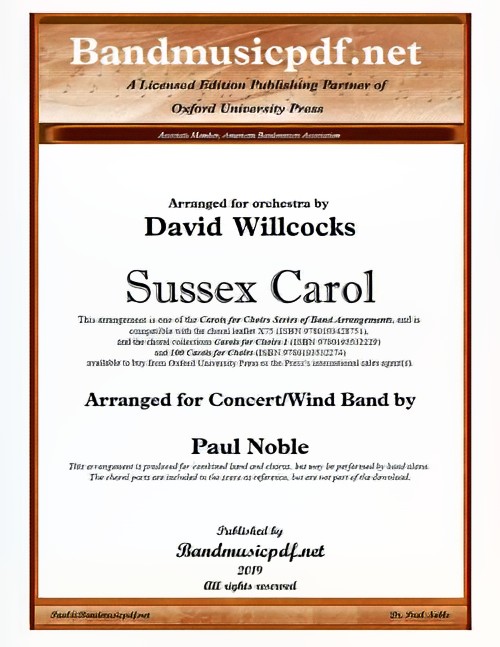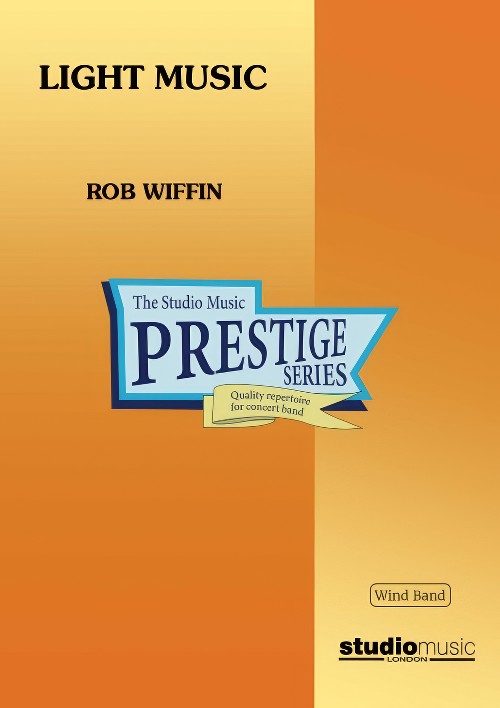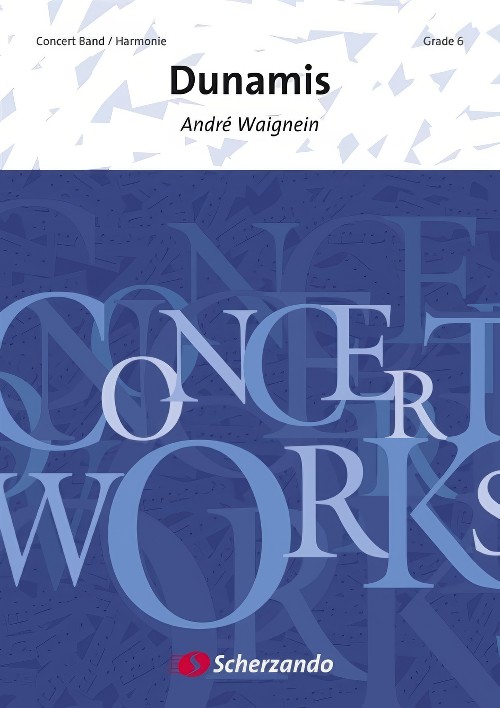Results
-
 £60.99
£60.99Down Under - Timothy Travis
A ballad that hints at Australia where its composer used to live for a couple of years. It was the friendliness of both its human and animal inhabitants that inspired him to write this little paragon of sonority destined to become a sure-fire crowd-pleaser. Its singing melody is accompanied by an altogether infectuous little motif.
Estimated dispatch 7-14 working days
-
£23.00
Duet Album Volume 9
March (Hndel) / Down By The Riverside / Largo Aus Der Neuen Welt (Dvorak) / Ave Maria (Schubert) / Clair De Lune (Debussy)
Estimated dispatch 10-14 working days
-
 £75.00
£75.00Sussex Carol (Concert Band with Optional Choir - Score and Parts) - Noble & Willcocks
The Sussex Carol is a Christmas carol popular in Britain, sometimes referred to by its first line On Christmas night all Christians sing. Its words were first published by Luke Wadding, a 17th-century Irish bishop, in a work called Small Garland of Pious and Godly Songs (1684). It is unclear whether Wadding wrote the song or was recording an earlier composition. Both the text and the tune to which it is now sung were discovered and written down by Cecil Sharp in Buckland, Gloucestershire, and Ralph Vaughan Williams, who heard it being sung by a Harriet Verrall of Monk's Gate, near Horsham, Sussex (hence Sussex Carol). The tune to which it is generally sung today is the one Vaughan Williams took down from Mrs. Verrall and published in 1919.
Estimated dispatch 7-14 working days
-
 £149.99
£149.99Jericho - Bert Appermont
Jericho is the musical translation of the well-known story from the book of Joshua about the capture of the city of Jericho by the Israelites.Part 1 depicts the cruel journey through the desert to Canaan, the promised land. An emotional lamentation for the yearning for a home, for the end of a roaming existence.The capture of Jericho is the theme of part 2. The city cannot be captured immediately and Jehovah orders an impressive army to march around the city for six days. On the seventh day, they marched around the city seven times and the priests blew their trumpets and the people cried so loud that the walls of Jericho came tumbling down. The Jews stormed the city and drove theinhabitants away. The music clearly reveals the marching army and you can hear the walls falling down with a tremendous noise. However, there is quite some artistic freedom in the actual story.A majestic and grand melody subsequently evokes the triumphant emotions that emerged as the fortified city fell (part 3).Following a personal and romantic interpretation, the scene ultimately ends in a typical Jewish feast (part 4) whereby the virtuosity of melodies played by the woodwinds and the passionate rhythms refer to traditional Jewish music. All themes are repeated in this last part in various forms, often simultaneous and in duelling counterpoint. The piece ends with fragments from the main theme of part 1 in major: peace and quiet return at last.
Estimated dispatch 7-14 working days
-
 £27.95
£27.95Light Music (Concert Band - Score only) - Wiffin, Rob
The title Light Music alludes to different things. Most of the music in the suite is light in nature, and is in the inherently British tradition of 'light music' - original pieces which are often descriptive but essentially melodic. In another sense the music depicts various aspects of light itself. The title itself is a trick of the light!The first movement, Lightscape, portrays shifting patterns and types of light, highlighting some details and obscuring others. It is sometimes vibrant, dancing and full of movement, and sometimes tranquil.The second movement, At the going down of the sun, considers the light of the sun as it sets. Because of the nature of his career, the composer has written a fair amount of ceremonial music and this movement is close to that genre once again. There is, in the title, a reference to the familiar Remembrance line 'At the going down of the sun and in the morning we will remember them' from the poem For the Fallen by Robert Laurence Binyon (1869-1943) written in September 1914, a few weeks after the outbreak of the First World War. While the music is not a setting of these words - or in any way referential - there is an echo of the words 'We will remember them'.The suite finishes with Set Alight which starts off with a few combustible bars as the flame catches and then the fire is under way.Duration: 11.30
Estimated dispatch 7-14 working days
-
 £137.95
£137.95Light Music (Concert Band - Score and Parts) - Wiffin, Rob
The title Light Music alludes to different things. Most of the music in the suite is light in nature, and is in the inherently British tradition of 'light music' - original pieces which are often descriptive but essentially melodic. In another sense the music depicts various aspects of light itself. The title itself is a trick of the light!The first movement, Lightscape, portrays shifting patterns and types of light, highlighting some details and obscuring others. It is sometimes vibrant, dancing and full of movement, and sometimes tranquil.The second movement, At the going down of the sun, considers the light of the sun as it sets. Because of the nature of his career, the composer has written a fair amount of ceremonial music and this movement is close to that genre once again. There is, in the title, a reference to the familiar Remembrance line 'At the going down of the sun and in the morning we will remember them' from the poem For the Fallen by Robert Laurence Binyon (1869-1943) written in September 1914, a few weeks after the outbreak of the First World War. While the music is not a setting of these words - or in any way referential - there is an echo of the words 'We will remember them'.The suite finishes with Set Alight which starts off with a few combustible bars as the flame catches and then the fire is under way.Duration: 11.30
Estimated dispatch 7-14 working days
-
 £209.99
£209.99Dunamis (Concert Band - Score and Parts) - Waignein, Andre
Major Yvon Ducene wanted a new lush and colourful composition for his Guides military band, with Andr Waignein as its composer. Early in 1979 the composer began his assignment and in October of the same year, the finished full score was on the music stands of this prestigious military band of the Belgian Army.The introduction (Grave) mirrors an atmosphere full of serenity in which the theme, played by the oboes and the English horn is predominant and immediately holds the listener spell-bound. It is taken up again as central element of the slow movement.The Allegro breaks away from the quiet passion of the introduction. Here, the band can really show its capabilities to the full. Based on a very precise rhythm, an idiom of sudden desperation and adversity develops which, fused with a crushing aggression, culminates in a kind of eruption, soon calmed down by a Lento : peace and quiet has returned thanks to a melody by the horns and soon taken over by the clarinets. In the meantime, the saxophone - an instrument full of human emotion - express the main spatial dimension in contemporary psyche. Following a harmonic transition the brass-players take up the theme again in forte whilst the basses and the woodwinds intertwine in technical arabesques.The movings of the mind and the heart get an audible and almost touchable shape in the ensuing Allegro, a movement characterised by a rhythmic dialogue in which the whole orchestra participates and where the exposition contains a wealth of sound and technical contrasts. The Lento finally uses the central theme of the slow movement again, with some occasional references to the two allegros. The last page is of unprecedented grandeur. All the instruments display their most beautiful sound which were named by Jacques Ferschotte, when speaking about Honneger, "harmonies d'intensits" harmonies of the unmeasurable.Duration: 14:30
Estimated dispatch 7-14 working days
-
 £193.20
£193.20CASTRVM - Lionel Beltrán-Cecilia
CASTRVM is a symphonic episode inspired by four of the main civilizations that have coexisted over time in Ulldecona's Castle. With its melodies and sound effects, the composer tries to transport the listener through a trip to four uninterrupted movements, from the beginnings of this small settlement, creating a natural atmosphere recreated by the voice and the singing of birds to take us into the history with the first inhabitants, the Iberians, giving strength to the introduction of the composition, to move on to the time of the Andalusians, which with a melody in the form of a dance marked by percussion will transport us to take a walk in the surroundings of its circular tower. Next, and with strength, we arrive at the medieval and Christian period, marked in the score by the brass instruments, in this fragment we find moments that take us into the church of "Santa Mara de los ngeles", with melodies that evoke resonance and pomposity, continuing until we find the immense square tower, symbol of the fortress and homage, finally used as a prison and arsenal of those times. Then, there is a small slow march that will move us to some measures of strong stridency to finish with the whole section of low brass having its great moment of prominence, down to we reach the last part, Qna, a name that is recited during the musical piece and one of the names given in the past to the area that could be seen from the castle, where the change of location of the new town is recreated leaving the castle site, but always looking at it with respect and admiration as at the beginning of what is now the current Ulldecona, in this part, the composer plays a bit with a very well-known and significant melody for the inhabitants of Ulldecona, the "Jota Vieja", first making a reflex effect of all its melody and then only with the first six notes of this one, which builds a bridge until reaching the march and, later, the grand finale of this symphonic episode. The work was commissioned by Ulldecona Town Council and the Ulldecona Music Band, led by its conductor Joan Nadal i Girona, to commemorate the 800th anniversary of the donation of the Town Charter of Ulldecona "the old" (1222-2022), as part of the PATRIMONIUM 20.22 programme, "La Banda (Sonora) del Castell" (The soundtrack of the Castle).CASTRVM consists of: I.Iberians: stone and ironII.AndalusiansIII.The square tower: fortress and homageIV.Qna
Estimated dispatch 7-14 working days
-
 £202.99
£202.99Gloriosa - Symphonic Poem for Band Movement 1 - Yasuhide Ito
A new acquisition by Bravo Music, this fresh printing of the 1990 masterwork by Yasuhide Ito features a newly engraved score, improved parts, good availability and value. This stirring and powerful homage to early Christianity in Japan profoundly and eloquently states the case of cross-cultural conflict and resolution.I. OratioThe Gregorian chant "Gloriosa" begins with the words, "O gloriosa Domina excelsa super sidera que te creavit provide lactasti sacro ubere." The first movement Oratio opens with bells sounding the hymn's initial phrases. The movement as a whole evokes the fervent prayers and suffering of the Crypto-Christians.II. CantusIII. Dies FestusCommissioned in 1989 and premiered in 1990 by the Sasebo Band of the Maritime Self-Defense Force of Kyushu, southern Japan.Gloriosa is inspired by the songs of the Kakure-Kirishitan (Crypto-Christians) of Kyushu who continued to practice their faith surreptitiously after the ban of Christianity, which had been introduced to that southern region in the mid-16th century by Roman Catholic missionary Francisco Xavier. The worship brought with it a variety of western music.Though Christianity was proscribed in 1612 by authority of the Tokugawa Shogunate in Edo (today Tokyo), Kakure-Kirishitan continued advocating sermons and disguised songs. Melodies and lyrics such as Gregorian chant were obliged to be "Japanized". For example, the Latin word "Gloriosa" was changed to "Gururiyoza." This adaptation of liturgy for survival inspired Ito to write this piece in order to reveal and solve this unique cultural mystery.The composer explains:"Nagasaki district in Kyushu region continued to accept foreign culture even during the seclusion period, as Japan's only window to the outer world. After the proscription of Christianity, the faith was preserved and handed down in secret in the Nagasaki and Shimabara areas of Kyushu region. My interest was piqued by the way in which the Latin words of Gregorian chants were gradually `Japanized' during the 200 years of hidden practice of the Christian faith. That music forms the basis of Gloriosa."Gloriosa, fusing Gregorian chant and Japanese folk music, displays the most sophisticated counterpoint yet found in any Japanese composition for wind orchestra.
Estimated dispatch 7-14 working days
-
£209.99
Gloriosa - Symphonic Poem for Band Mvt 2 & 3 - Yasuhide Ito
A new acquisition by Bravo Music, this fresh printing of the 1990 masterwork by Yasuhide Ito features a newly engraved score, improved parts, good availability and value. This stirring and powerful homage to early Christianity in Japan profoundly and eloquently states the case of cross-cultural conflict and resolution.I. OratioThe Gregorian chant "Gloriosa" begins with the words, "O gloriosa Domina excelsa super sidera que te creavit provide lactasti sacro ubere." The first movement Oratio opens with bells sounding the hymn's initial phrases. The movement as a whole evokes the fervent prayers and suffering of the Crypto-Christians.II. CantusIII. Dies FestusCommissioned in 1989 and premiered in 1990 by the Sasebo Band of the Maritime Self-Defense Force of Kyushu, southern Japan.Gloriosa is inspired by the songs of the Kakure-Kirishitan (Crypto-Christians) of Kyushu who continued to practice their faith surreptitiously after the ban of Christianity, which had been introduced to that southern region in the mid-16th century by Roman Catholic missionary Francisco Xavier. The worship brought with it a variety of western music.Though Christianity was proscribed in 1612 by authority of the Tokugawa Shogunate in Edo (today Tokyo), Kakure-Kirishitan continued advocating sermons and disguised songs. Melodies and lyrics such as Gregorian chant were obliged to be "Japanized". For example, the Latin word "Gloriosa" was changed to "Gururiyoza." This adaptation of liturgy for survival inspired Ito to write this piece in order to reveal and solve this unique cultural mystery.The composer explains:"Nagasaki district in Kyushu region continued to accept foreign culture even during the seclusion period, as Japan's only window to the outer world. After the proscription of Christianity, the faith was preserved and handed down in secret in the Nagasaki and Shimabara areas of Kyushu region. My interest was piqued by the way in which the Latin words of Gregorian chants were gradually `Japanized' during the 200 years of hidden practice of the Christian faith. That music forms the basis of Gloriosa."Gloriosa, fusing Gregorian chant and Japanese folk music, displays the most sophisticated counterpoint yet found in any Japanese composition for wind orchestra.
Estimated dispatch 7-14 working days
